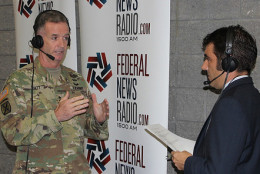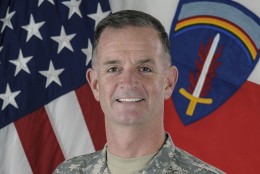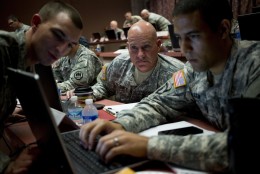Army
-
Association of the U.S. Army hosts its annual conference at the Walter E. Washington Convention Center in Washington, D.C.
October 04, 2016 -
Patrick Murphy, the Undersecretary of the Army, previously served as a congressman from Pennsylvania, and is an Army veteran. At the Association of the U.S. Army's conference, he tells Jared Serbu on Federal Drive with Tom Temin about a topic he's devoted a significant amount of attention to since taking office this past January — the Army's Soldier for Life initiative.
October 04, 2016 -
Lt. Gen. Stephen Lanza is the commander of the Army's I Corps, based at Joint Base Lewis-McChord, Washington, but heavily engaged throughout the Pacific. He joined Jared Serbu on Federal Drive with Tom Temin at the Association of the U.S. Army conference with an update on some of I Corps' activities over the past year.
October 04, 2016 -
The Army's Rapid Capabilities Office is barely a month old, but Army leaders already have a strong idea of what they want the new organization to pursue. Early priorities are electronic warfare, cyber, and position, navigation and timing. Maj. Gen. Walter Piatt, the office's deputy director for operations, joined Jared Serbu on Federal Drive with Tom Temin at this week's Association of the U.S. Army conference here in Washington with a preview of some of the work ahead.
October 04, 2016 -
Welcome to the #FedFeed, a daily collection of federal ephemera gathered from social media and presented for your enjoyment.
September 29, 2016 -
When it comes to the technological superiority of the Army’s battlefield equipment, officials worry it’s on the wane because of a sort of a perfect storm
September 28, 2016 -
The chairman of the Senate Armed Services Committee lashes out at the Obama Administration — accusing officials of failing to consult with Congress on important cyber defense topics. John McCain says the administration has failed to deliver a strategy on deterring hackers.
September 19, 2016 -
The Army is reexamining the cases of at least 73 soldiers who it kicked out under other-than-honorable circumstances between 2009 and 2015 because it may have run afoul of a federal law intended to help ensure troops aren’t punished for mental health issues.
September 19, 2016 -
Welcome to the #FedFeed, a daily collection of federal ephemera gathered from social media and presented for your enjoyment.
September 16, 2016 -
No doubt about it. The Army has had success with robots in the last few years. For instance, robots have detected and disarmed roadside bombs. But you could characterize Army robotics as version 1.0. The next generation of robots must cost less. They've got to be more flexible and programmable. Easier to maintain. A big question is whether industry can deliver. Sandra Erwin, editor of National Defense magazine, joins the Federal Drive with Tom Temin with more.
September 13, 2016 -
Welcome to the #FedFeed, a daily collection of federal ephemera collected from social media and presented for your enjoyment.
September 12, 2016 -
The DoD inspector general looked at 56 Army contracts awarded by five Army contracting shops to see whether the Army was consistent in evaluating past performance.
August 30, 2016 -
In today's Top Federal Headlines, a large group of government transparency advocacy groups has asked members of Congress to disallow proposal to give DoD more FOIA exemptions.
August 25, 2016 -
In today's Top Federal Headlines, Maryland's two Senators write the Office of Personnel Management to express the concern they're hearing from federal employees about the dramatic premium increases for the program.
August 24, 2016 -
What the Army needs to worry about is a bathtub-shaped dip in productivity 'til people get used to what lies ahead.
August 19, 2016













